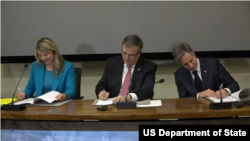The leaders of Canada, Mexico, and the United States met recently in Mexico City at the North American Leaders’ Summit (NALS) to discuss security and economic cooperation.
The Summit included a recognition of the importance of fighting against inequality, racism, and discrimination.
Standing alongside Mexican Foreign Secretary Marcelo Ebrard and Canadian Foreign Minister Mélanie Joly, Secretary of State Antony Blinken underscored the value of “focusing on a common ideal that is at the core of our democracies: that we are all better off when every individual in our societies enjoys equal rights and equal opportunities.”
Before signing the North American Declaration on Partnership for Equity and Racial Justice along with his counterparts, Secretary Blinken noted that the Declaration establishes three ways to ensure all communities and individuals reach their full potential.
“First, the fight for greater equity and inclusion begins at home. In every nation, members of marginalized groups face discrimination,” Secretary Blinken declared. “It’s a daily reality for people from Indigenous communities and communities of African descent, women and girls, LGBTQI+ people, people with disabilities, religious minorities and others, including in the United States.” He praised the willingness of all three countries to acknowledge that the work must initially be undertaken at home. That, he said, “is vital to our legitimacy when it comes to the Declaration’s second commitment: redoubling our collaboration to advance equity and racial justice around the world.”
The third way to promote equity is to draw on the knowledge and expertise of leaders outside government. The three countries will establish a Trilateral Racial Equity and Inclusion Expert Network, consisting of leaders from civil society, youth groups, the private sector, and academia to share best practices and innovative strategies. “Simply put, one of our greatest strengths as democracies [is] that we trust our people,” said Secretary Blinken. “We trust our citizens to help fix some of our most intractable problems.”
Progress consists of citizens working “every single day to make our societies a little bit better, a little bit stronger, a little bit more inclusive,” Secretary Blinken declared. “We’re fortunate to have neighbors who share our highest ideals and a steadfast commitment to keep working to make them a reality.”






